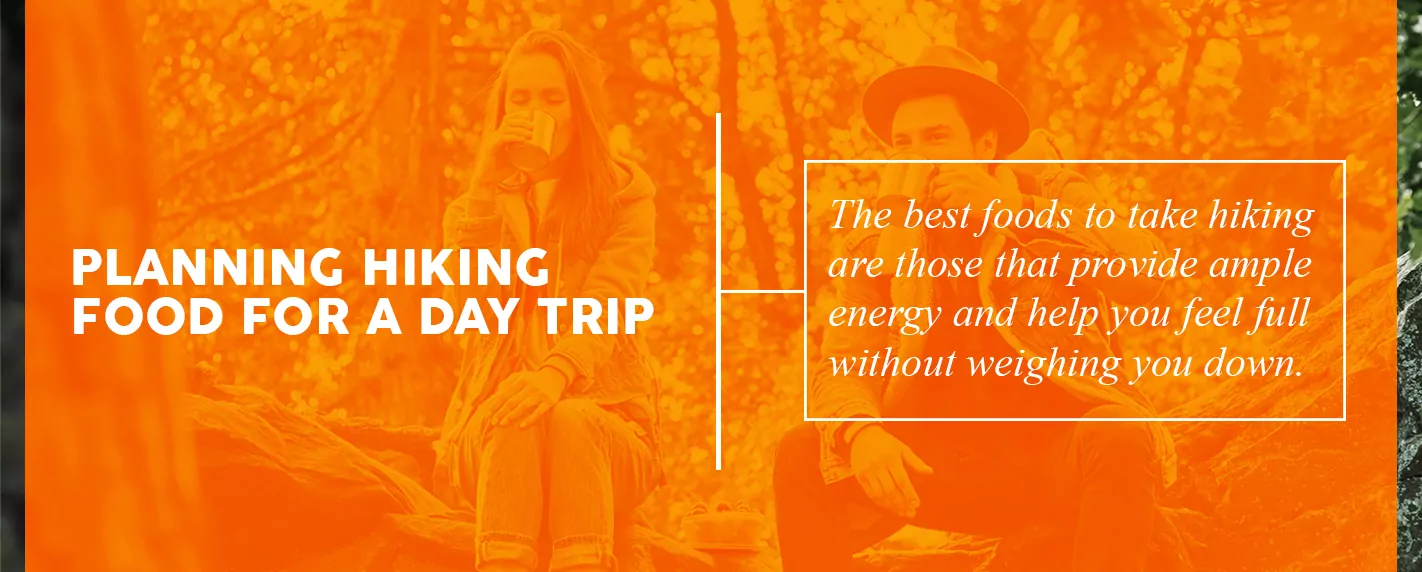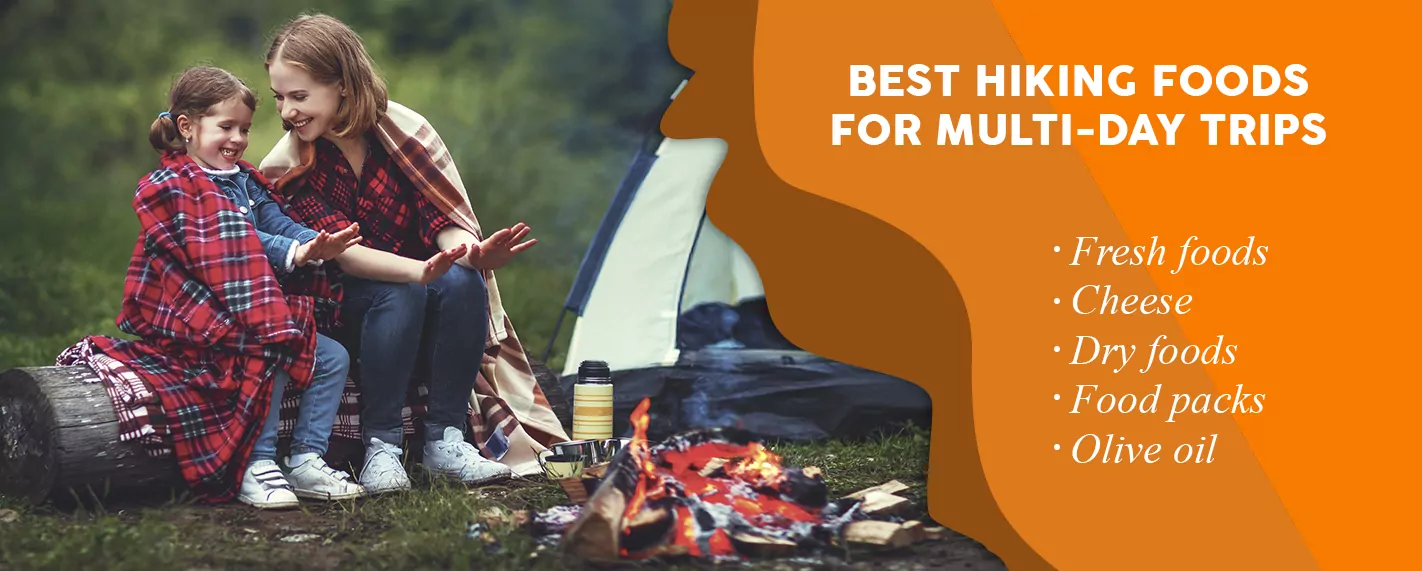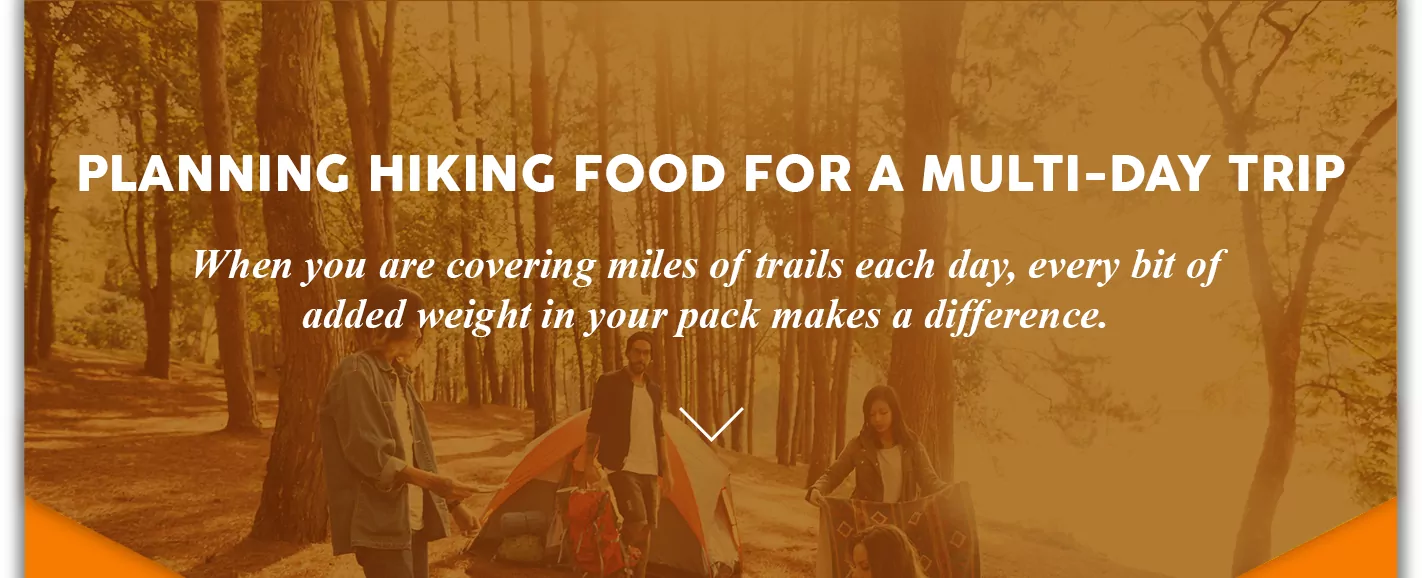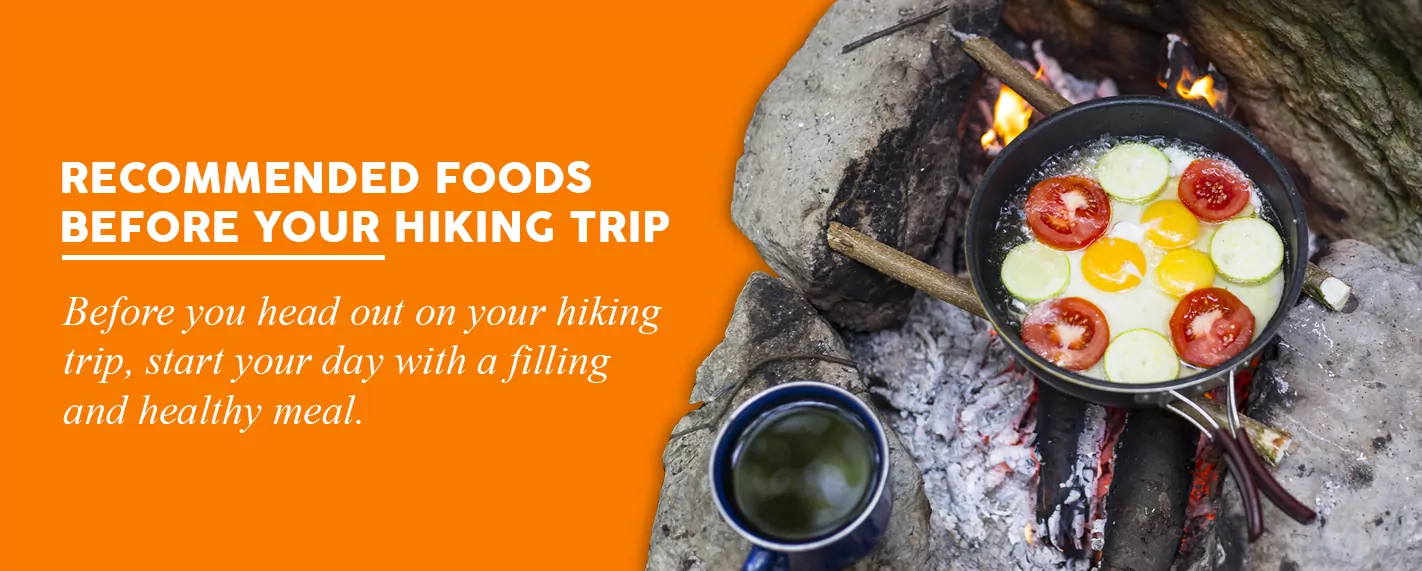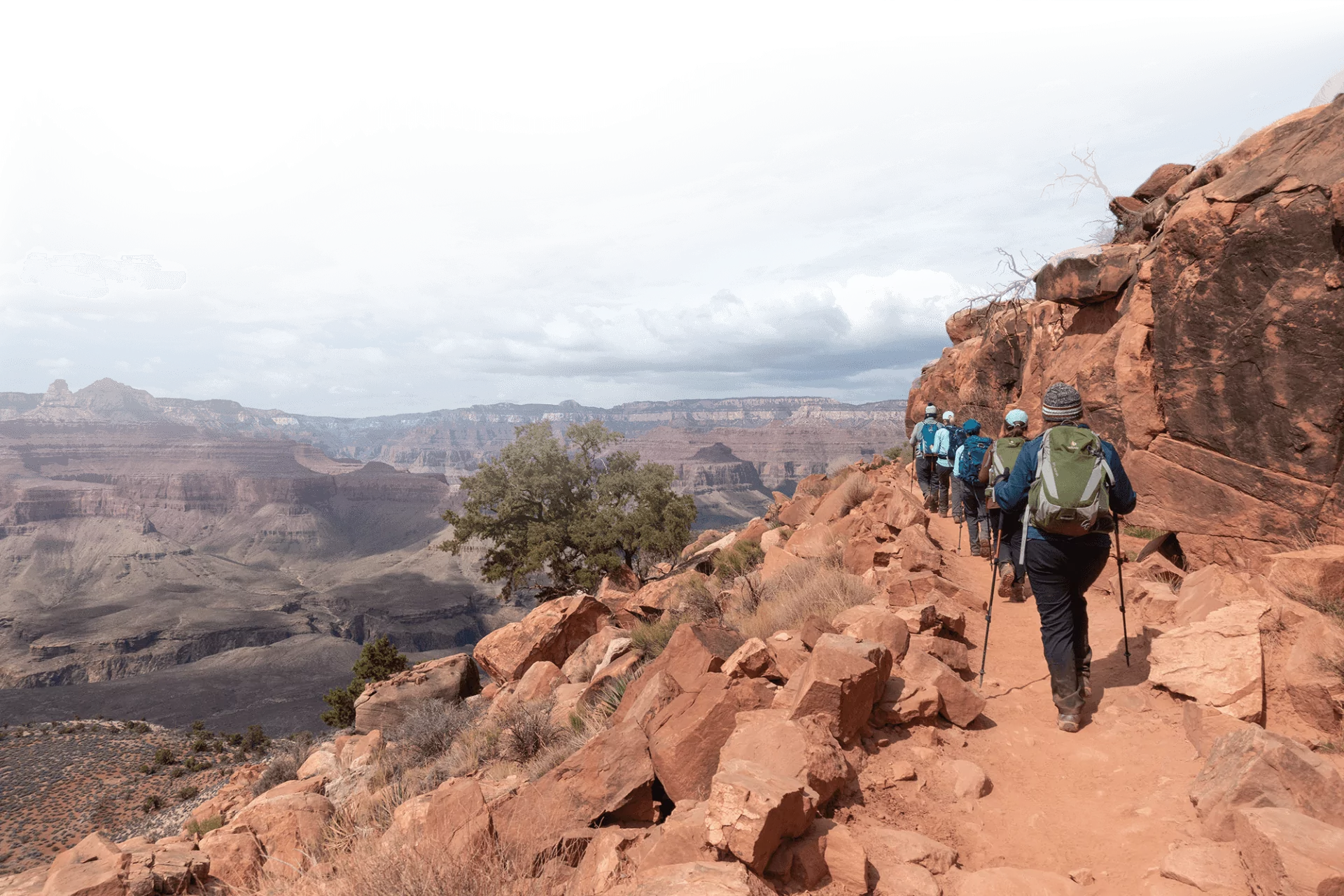Best Foods to Eat While Hiking
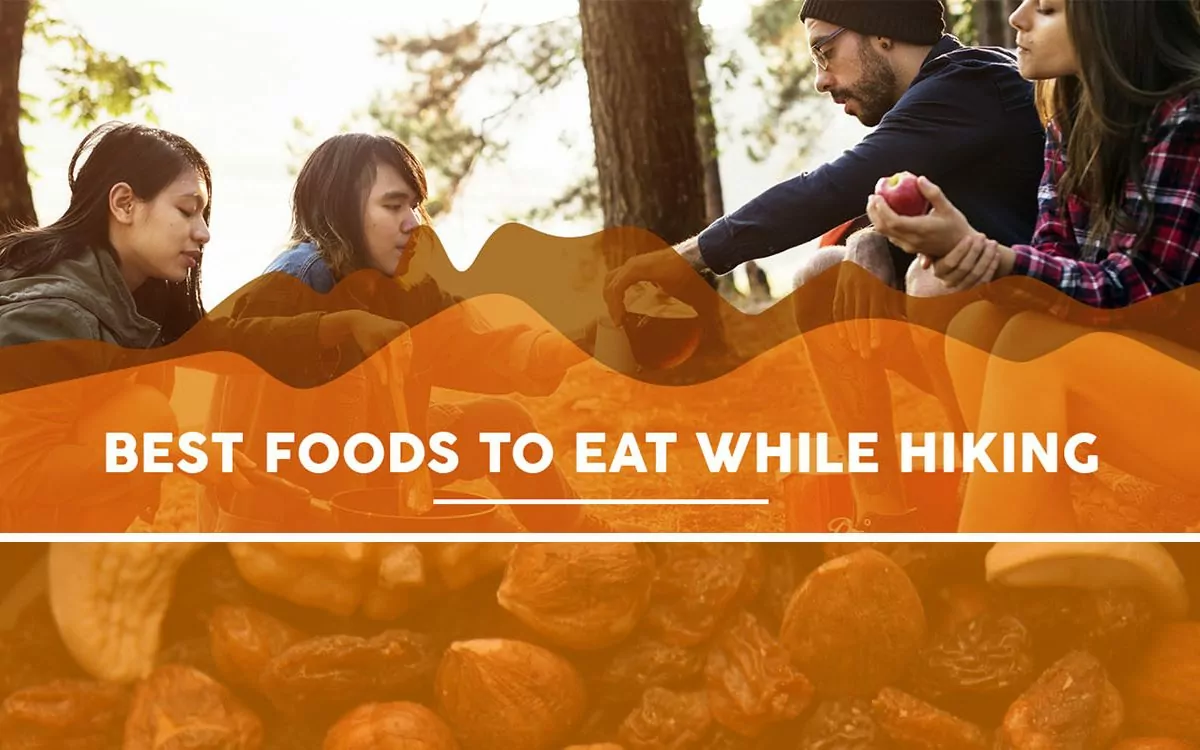
Whether you are taking a quick afternoon hike or planning a week-long hiking excursion, choosing the right food to bring on a hike can help you feel great to tackle any trail. The best foods to eat while hiking will serve as fuel that gets you started, keep you going and help you recover after a strenuous hiking trip. When planning food for long hikes, look for lightweight, filling and nutritious snacks and meals to power you through even the most challenging hikes or backpacking trips.
Best Foods for day hikes
The best foods to take hiking are those that provide ample energy and help you feel full without weighing you down. Instead of fatty or sugary foods that can make you crash or feel lethargic, choose foods with complex carbohydrates and proteins for energy that lasts all day long. If you begin your day with a healthy and protein-packed meal, you can power through a long day hike by enjoying small healthy snacks every few hours.
Planning Food for Day Hikes
Here are a few considerations for planning food for day hikes. These are only guidelines as trekkers often prefer different foods while on the trail.
- Focus on lasting energy: The best foods for hiking will be nutrient-dense and provide lasting energy. Rather than sugars that only offer a quick boost of energy, choose proteins, complex carbohydrates and healthy fats that are digested more slowly and release a steady supply of energy.
- Enjoy something fresh: When choosing food for day hikes, you are not limited to non-perishable foods as you may be on a multi-day hiking trip. Bring along fresh fruits or vegetables as well as cheese for a fast and refreshing trail snack or enjoy your favorite sandwich for lunch.
- Keep it cool: For shorter or less challenging day hikes, you may choose to bring a small cooler for even more hiking food options. Enjoy cold pasta salad, a refreshing beverage or other perishable foods when you bring a cooler and ice pack. Alternatively, if you are carrying a day pack with a hydration bladder, try putting ice in the bladder and sticking your cold food in the same compartment. You’ll find it plenty cold by the time you break it out.
- Stay hydrated: Drink water before your hike and pack enough water to last the entire day. Especially remember to drink water if it is cold as you will not feel as thirsty. However, before careful not to drink too much water as this can lead to water poisoning which is just as dangerous as dehydration. It’s important to eat salty snacks as well as drink water throughout the day to maintain your sodium blood levels. You can read more about water intoxication here. Staying hydrated will also keep you energized and feeling great.
- Bring a little extra: Determine how much food and water to pack based on how long and how strenuous the hike is and then pack a little bit extra. You will be exerting energy all day, so be prepared with enough water and snacks to keep your body fueled.
Recommended Food for Day Hikes
It’s important to think about what you are eating even for a day hike as you will be burning lots of calories and want to make sure to stay safe on the trail. Eat protein rich foods or foods with complex carbohydrates for breakfast before your hike to jump start your energy for the day. Oatmeal, eggs, nuts and nut butters, healthy bars, and/or fruits and veggies are all great ways to get your digestive system off to a good start for the day. Things to avoid would be sugary cereals, bars with excessive chocolate or sweets (some is ok), pancakes, and waffles. These foods will make you crash a few miles into your hike which isn’t a good option if you’re looking for an exciting day on the trail
Here are some recommendations for foods to take with you on your hike. Whether you are planning on snacking your way through lunch or just want to make sure you have something to munch on while doing a shorter hike, these are your best options. They’re easy to pack, energy boosting, and delicious.
- Protein and carb dense bars: Granola bars packed with nuts, dried fruit and berries, and refined sugar alternatives like honey or agave nectar are greats snacks to grab and eat while on the trail.
- Fruits and veggies: Not only are fruits and veggies such as apples, oranges, pears, bell peppers, and carrots great energy sources, they are also generally sweet and refreshing for a quick break on hot trails
- Cheese: An excellent source of energy and simply delicious, cheese is a great option for supplementing a meal on the trail. If you’re not bringing a cooler but are wearing a pack with a hydration bladder, try putting ice in the bladder and putting your cheese in the same compartment. It will be plenty cold when you’re ready to eat it.
- Nuts: Perhaps the classic ball game snack, nuts are a good source of protein, can be eaten while walking, and give that crunch factor we all crave sometimes.
- Dried meats: Meats give some of the longest lasting energy and can also really fill you up. Beef jerky is the most common option, but if you don’t mind the each weight, tuna or other canned meats can be great as well.
It’s also important after your hike to replenish your depleted resources in order to recover sooner (so you can get back out there to hike again sooner). Many of the same principles apply to what kind of foods you want to eat apply as your body will be rebuilding your energy stores and muscles. This means that meals like lean meats, leafy greens, pasta, cheese, yogurt, and other food high in protein and carbs are great options.
Explore Your World. Award Winning Hiking Guides
Best Hiking Foods for Multi-Day Trips
Here are a few types of food to consider packing for your next hiking trip that takes you to the backcountry for a few days. These principles differ from day hiking because you will have to think and pack all your meals instead of just one or two. In later sections, you can see specific recommendations for lunches and dinners, but these are the kinds of food you’ll want to keep in mind for a backpacking trip, specific varieties to be chosen later.
Types of Foods
- Fresh foods: Because you will be eating non-perishable foods for the rest of your hiking trip, you may want to pack some perishable foods to enjoy on the first day of your hike. Fresh fruits and vegetables can be a refreshing start to your hiking adventure.
- Dry foods: Dry foods like rice, instant noodles, and soup mixes are some of the best lightweight hiking foods and take up very little space in your pack. These easy-to-make foods can also become creative meals when combined with dried vegetables, beans or spices.
- Food packs: Instead of bulky and heavy canned food, look for your favorite canned foods in lighter packages. Packs of tuna or salmon can provide healthy protein and are ready-to-eat. You will also be able to leave your can opener at home.
- Dehydrated or freeze-dried foods: Although somewhat more expensive than other options, dehydrated or freeze-dried meals offer excellent convenience. Simply heat water and then enjoy a filling and calorie-dense meal. These can be especially nice if you’ve had a long day and don’t want to trouble with cooking or clean up, as most eat these meals right out of the bag. You also might want to try out a couple different meals on a camping trip to ensure that you will like what you bring.
Drinks
- Water filter or purification tablets: When planning a multi-day hike, you will not have enough room in your pack to bring bottled water for the whole trip, so remember to bring some water filtration method instead. A small portable water filter or water purification tablets are both great options.
- Powdered beverage mixes: Adding powdered drink mixes to your water can provide extra electrolytes to keep you feeling refreshed and energized. You can also use protein powder as a simple way to consume more protein during a hiking trip.
- Caffeine and alcohol: It’s worth mentioning that you should not bring caffeine or alcohol on your trips as neither of these drinks mix well with trekking or high elevation. They both also eventually reduce you energy and dehydrate you.
Planning Hiking Food for a Multi-Day Trip
If you are planning a multi-day hiking trip, choosing compact and lightweight hiking foods is even more critical. When you are covering miles of trails each day, every bit of added weight in your pack makes a difference. You will also want to choose foods that take up as little valuable space in your pack as possible. Choosing nutritious and filling foods is also vital for powering through long or challenging hiking trips. The best food for long hikes will be lightweight, small, easy-to-eat and healthy.
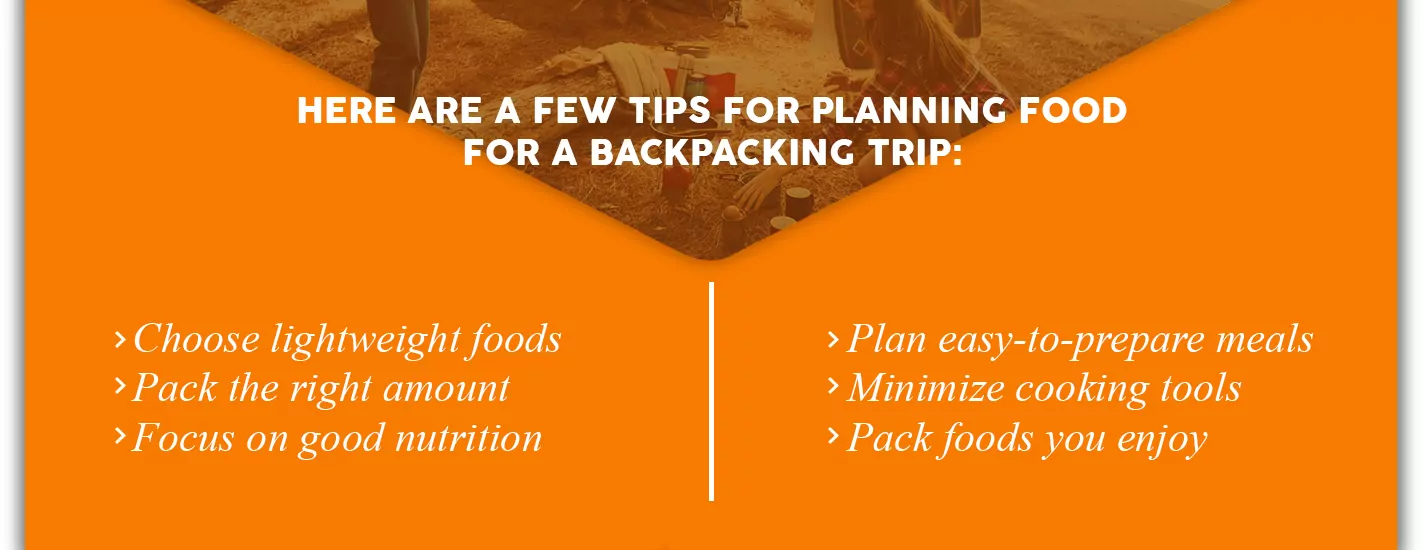
- Choose lightweight foods: Reduce weight in your pack by choosing light and compact foods, such as dehydrated or freeze-dried meals or other dry foods and snacks. Repackage bulky products into plastic baggies to further save space in your pack.
- Pack the right amount: Estimate how many calories you will burn each day by considering your weight, the weight of your pack, how challenging the hike will be and how long you plan to hike each day. If you want to maintain your weight while hiking, pack enough food to make up all the calories you burn each day. However, you should always pack a little bit extra in case you get behind schedule and are on the trail longer than expected. If you are hiking in cold weather, your body will also need more calories to stay warm.
- Focus on good nutrition: Choose high-protein foods and complex carbohydrates to energize you during your backpacking trip. You will burn a lot of calories each day, so pack foods with high amounts of calories, protein, fiber, carbohydrates and electrolytes to replenish your body. Foods that offer stable energy will also keep you feeling full without weighing you down or leading to a crash.
- Opt for nutrient-dense foods: Pick foods that provide a lot of calories and nutrients while taking up the least amount of space. The best foods for backpacking will have a high calorie-to-ounce ratio.
- Plan easy-to-prepare meals: After a long day on the trail, you will be grateful for a warm meal that is easy to prepare. Plan meals that can be made in one pot or do not require utensils at all, like dehydrated meals, rice or instant noodles. These fast and filling meals also require minimal clean-up so you can get the rest you need to tackle the next day on the trail.
- Minimize cooking tools and utensils: To keep your pack as light as possible, plan meals that require minimal cooking tools and utensils. A simple pot can be used to boil water for dehydrated meals, make rice or pasta and even make coffee for a morning energy boost.
- Pack foods you enjoy: With so many options of lightweight trail foods and dehydrated meals, you can always find backpacking foods you enjoy. At the end of a long day of hiking, you will be grateful for the comfort of a delicious meal.
- Keep the altitude and trekking environment in mind: If this is your first backpacking trip or your first trip into high elevation, keep in mind that the elevation and long days of hiking tend to change appetites and even food preferences. Many first time backpackers bring chocolate bars as treats at the end of a long day, but end up packing them out because they didn’t sound appealing.
Recommended Foods Before Your Hiking Trip
Before you head out on your hiking trip, start your day with a filling and healthy meal. Whether you are going on a short day hike or heading out for a long trip, fueling up with carbohydrates and proteins will help you tackle any mountain. Here are a few of the best hiking foods to eat before you hit the trail:
1. Oatmeal
- Oatmeal is high in fiber and full of healthy carbohydrates, making it an excellent choice for lasting energy. If you want to up your game with extra protein, consider adding protein powder or mixing peanut butter into your oatmeal. Sprinkle nuts, seeds or dried fruit on top of your oatmeal and top it off with honey for a delicious and filling breakfast.
- If you are on a more extended backpacking trip, instant oatmeal or grits is a fast and easy breakfast option. Some oatmeal packets also serve as a bowl so you do not need to clean any dishes before heading out for the day.
2. Eggs
- Packed with protein and easy to prepare, eggs are another great option for a pre-hike breakfast. A single large egg has about 77 calories and 6 grams of protein, making it extremely nutrient-dense. Eggs are also rich in B vitamins and amino acids that aid in energy production. The amino acid leucine, which is found in a high concentration in eggs, also supports muscle recovery and can be beneficial for endurance training. When preparing for a long hike, incorporating eggs in your diet may help build your endurance and boost your strength.
- While you are on a multi-day backpacking trip, powdered eggs can be a great alternative to regular eggs. This popular trail breakfast is lightweight and can be prepared quickly. If you brought along your spices, you can enjoy a delicious and warm breakfast with dehydrated eggs.
3. Fruits
- Fruits that are high in carbohydrates and full of delicious natural sugars make a great snack during a hike. Instead of reaching for a candy bar, choose a crisp apple that offers a slow release of energy with about 25 grams of carbohydrates and 4 grams of fiber.
- Bananas are another perfect food to eat before a hike as they provide healthy carbohydrates and are rich in potassium and vitamin B6. Bananas may even be as effective as a carbohydrate drink for delivering energy during endurance workouts.
- For a well-balanced meal before a hike, add fruit to your morning oatmeal or mix it into a bowl of Greek yogurt. Yogurt is an excellent source of protein to pair with carbohydrate-rich fruit.
- Fruit juices often contain a lot of processed sugars, so choose fresh fruits whenever possible. If you are on a multi-day hiking trip, consider starting your day with a serving of dried fruit. Dried fruit can also be a delicious addition to your instant oatmeal. Look for dried or freeze-dried fruits that do not contain added sugars for the best boost of healthy energy without a sugar crash.
4. Vegetables
- Like fruits, many vegetables also contain healthy complex carbohydrates. Sweet potatoes are a carbohydrate- and fiber-rich vegetable that also contains 50 percent of your daily recommended dose of manganese per serving. Manganese is a mineral that aids in metabolism and helps your body break down carbohydrates. Other great veggies to enjoy before a hike include carrots, dark leafy greens and beets. Carrots are a perfect choice for a longer backpacking trip as they can last longer without being refrigerated.
5. Nut Butters
- Nut butters are an excellent source of protein and fiber for healthy energy and muscle strength. Nut butters are available in many different varieties including almond, cashew, pecan and classic peanut butter, so you can find your favorite flavor. Nut butters can be spread on whole grain toast or mixed into your morning oatmeal for a perfect combination of carbohydrates, fats and proteins.
- For long backpacking adventures, nut butters are available in compact and easy-to-eat packages, or you can toss a whole jar in your pack. You may also opt to munch on plain nuts and seeds instead. These butters also go great on tortillas which make a great alternative to bulkier bread that may go bad sooner.
6. Lean Meats
- Lean meats, such as poultry or fish, provide a protein punch without excess fat. Protein is an important macro-nutrient for boosting your metabolism and helping build and repair your muscles. When backpacking for a long time or tackling challenging peaks, your muscles will thank you for the support.
- For a long backpacking trip when bringing fresh meats is not possible, look for jerky made from turkey, salmon or other lean meats.
7. Pasta
- Before embarking on a long hike, a bowl of whole grain pasta can be a great way to stock up on carbohydrates. Mix in your lean meats and vegetables for a balanced and protein-packed meal. Choose a light pasta sauce instead of creamy cheese sauce and keep your portion a reasonable size. While pasta provides excellent energy, too many carbohydrates may end up weighing you down instead.
Recommended Food for lunches During Your Hiking Trip
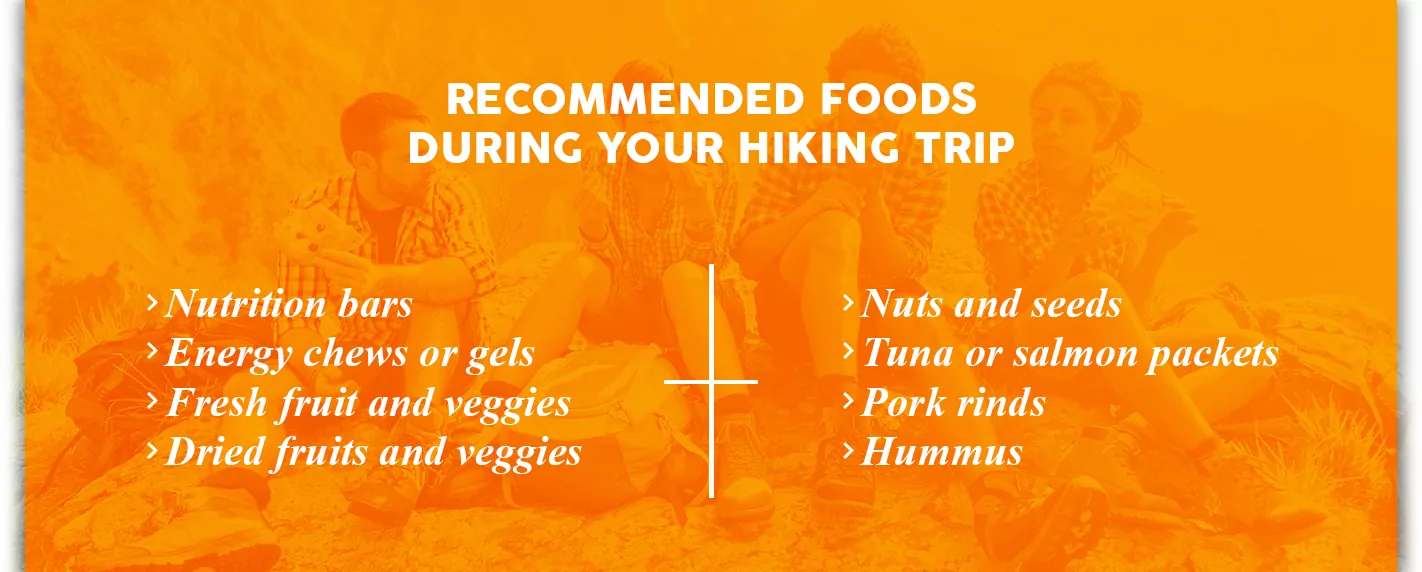 If you have eaten a good meal before your hike, you should feel energized for a long time. However, it is still important to refuel your body during your hike. Pack enough food to enjoy a small snack about every two hours. By regularly supplying your body with nutrients, you can stay energized throughout your hike.
If you have eaten a good meal before your hike, you should feel energized for a long time. However, it is still important to refuel your body during your hike. Pack enough food to enjoy a small snack about every two hours. By regularly supplying your body with nutrients, you can stay energized throughout your hike.
The best foods to bring on a hike will be easy to eat without cooking. Especially if you are on a multi-day hike, you will be grateful to enjoy a quick lunch without stopping and unloading your pack. Here are some of the best foods to eat while hiking:
1. Nutrition bars
Nutrition or energy bars are compact and can offer a large dose of protein and carbohydrates. Look for bars that contain vitamins and minerals to refuel your body, as well as healthy fats. Choose nutrition bars that contain primarily natural ingredients without any added sugars to enjoy the greatest benefit.
2. Energy chews or gels
Energy chews or gels can offer the same benefits as nutrition bars but take up less space in your pack and can be faster to eat. Energy chews often taste like gummy candies and can also have added nutrients and electrolytes. Energy gels and chews are great for a quick boost of calories during an extended backpacking trip.
3. Fresh fruit and veggies
Fresh fruits and vegetables are a healthy snack for day hikes or the first day of a backpacking trip. Toss some carrots or celery in your pack for a refreshing treat as you tackle the mountain.
4. Dried fruits and veggies
Dried or freeze-dried fruits and vegetables are perfect for backpacking trips when your pack space is limited. Dried fruits can taste like candy without the unhealthy processed sugars and can be a good source of vitamins and minerals. Seaweed is a perfect dried vegetable option as it is super lightweight, crispy and delicious.
5. Trail mix
Trail mix is a classic hiking snack that provides protein and healthy fats. If you have a sweet tooth, toss some dark chocolate or dried fruit in your trail mix or stick to seeds and nuts if you prefer savory snacks.
6. Nuts and seeds
Nuts and seeds provide healthy fats, a high concentration of protein and excellent calorie-per-ounce ratio, making them one of the best foods for hiking. Enjoy your nuts and seeds in granola bars or nut butters or simply munch on them plain.
7. Jerky
Great for long distance hikes, jerky takes up very little space in your pack but provides a lot of protein. Jerky is available in many different types of meat — including turkey, salmon, beef and venison — as well as almost any flavor to suit your taste.
8. Tuna or salmon packets
Instead of bringing canned fish on your backpacking trip, pack lightweight pouches of poultry, tuna or salmon. These packets are available in single servings, making them a simple and quick protein boost.
9. Pork rinds
Pork rinds are a great source of protein and make a delicious hiking snack. They can also offer a light and crunchy texture, while many other backpacking foods are much denser.
10. Hummus
Packed with calories, carbohydrates, fiber and protein, hummus is a healthy and energizing hiking snack. Hummus goes great with fresh veggies or can be spread on crackers, tortillas or bagels.
11. Cheese
Like many of these recommended foods, cheese is nutrient- and calorie-dense as well as a great source of protein. Cheese pairs well with fresh fruits and vegetables, jerky or crackers for an easy snack or can be added to almost any meal for extra richness and flavor.
12. Nut Butters and Tortillas
This is a great option for changing up what you eat for lunch on those long hiking day. There are even some individual jelly packs that you can buy to make PB&J tortilla wraps for a taste of home
Recommended Food for dinners During Your Hiking Trip
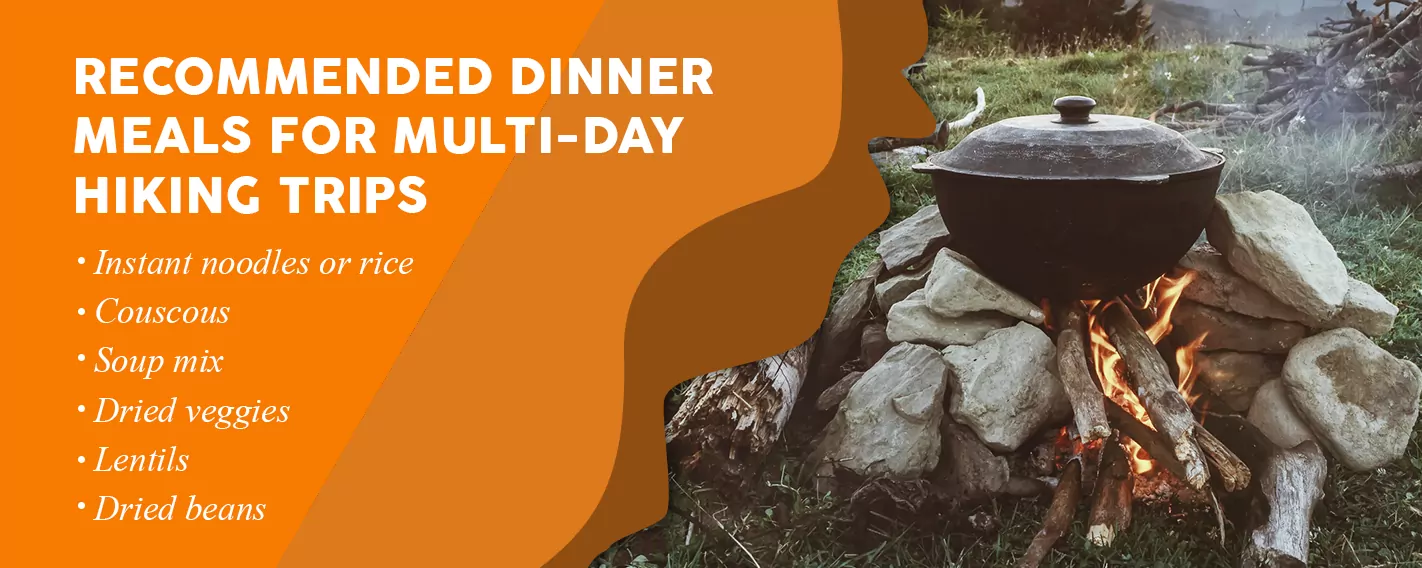
At the end of a day hike, you will most likely return to your campsite or head back home, but during a backpacking trip, you will end each day on the trail. For multi-day hiking trips, plan healthy and filling meals for dinner to replenish your body and help rebuild your muscles. While you will still be limited to foods you can bring in your backpack, dinner is when you can enjoy a warm meal cooked over the fire.
Here are some backpacking food ideas to inspire you for cooking dinners on the trail:
1. Instant noodles or rice
Fast and simple to prepare, instant noodles are a popular hiking meal. Rice is another great option that can be spiced up with vegetables and seasonings. Noodles and rice are both high in carbohydrates and are fairly easy to clean up when your meal is finished.
2. Couscous
Couscous cooks even more quickly than rice or noodles and is high in fiber and carbohydrates. You can also enjoy its unique texture and create your own recipes by tossing in your favorite spices.
3. Soup mix
Soup mixes are available in a wide range of flavors and can be prepared quickly with hot water. Soups with meat-based broth can also offer additional protein as well as sodium.
4. Dried veggies
Dried vegetables are a great way to add more vitamins and minerals to your hiking meals. Mix dried vegetables into your noodles, rice, couscous or soup for improved taste and health benefits.
5. Lentils
These compact legumes are full of protein, fiber and iron and can be cooked in your rice or added to couscous.
6. Dried beans
Like lentils, beans are full of protein and other nutrients. They can fit easily in your pack and provide a great base for a meal. Black beans and refried beans can be made quickly by adding boiling water.
7. Freeze-dried meals
Although often more expensive than other hiking foods, freeze-dried meals offer the most convenience and are available in many different flavors.
Recommended Foods After Your Hiking Trip
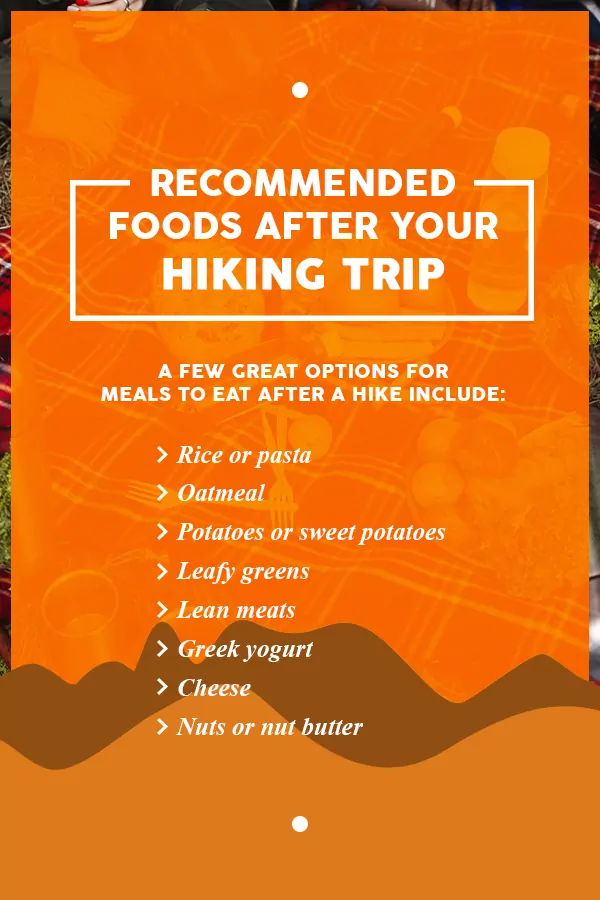
When you exercise, such as going on a hike, your body uses its glycogen stores for energy. Some proteins in your muscles are also broken down when you work out. After you finish exercising, your body must replenish its glycogen stores and repair its muscle proteins. Eating certain foods after exercising can expedite this process and help your body repair itself after a hard hike.
The best foods to eat after a hike are those that are high in carbohydrates and proteins. Eating high-protein foods supplies amino acids that help your body rebuild its muscle proteins while eating high-carbohydrate foods aids in replenishing glycogen stores. Eating carbohydrates is particularly important in endurance training, such as long hikes. Your body can rebuild its glycogen and muscle proteins better following exercise, so aim to eat a meal about 45 minutes after a strenuous hike.
When planning a meal for the end of your day hike, you have a lot more flexibility because you are not limited to what you can fit in your backpack. A few great options for meals to eat after a hike include:
- Rice or pasta
- Oatmeal
- Potatoes or sweet potatoes
- Leafy greens
- Lean meats
- Greek yogurt
- Cheese
- Nuts or nut butter
Keep a cooler in your car with a prepared post-hike meal or stop at a restaurant on the way home. Just be careful not to go overboard — while it may be tempting to stop at your favorite burger joint, you will feel much better after enjoying a healthy and filling meal instead.
Plan Your Next Hiking Trip With Wildland Trekking

If you would rather not bother with the details of backcountry food planning or want to enjoy amazing backcountry cuisine, consider planning an all-inclusive hiking trip with Wildland Trekking. You can explore hiking destinations across the country and around the world, and we will take care of all the arrangements. Choose your destination and trip style (variety of hiking and backpacking trips and tours), and we will provide top-of-the-line gear and an exceptional certified guide to lead the way and keep you safe. Wildland Trekking even offers customized meals to suit your dietary preferences and ensure you eat well on your hiking adventure.
Contact us to learn more about our hiking and backpacking trips, or book a trip below.
Wildland Trekking Hiking Adventures
As the world’s premier hiking and trekking tour operator, Wildland believes in connecting people to fantastic environments in amazing new ways. To learn more about our guided backpacking trips, llama treks, portered trips, camping tours, inn-based tours and more, please visit our website or connect with one of our Adventure Consultants: 800-715-HIKE



